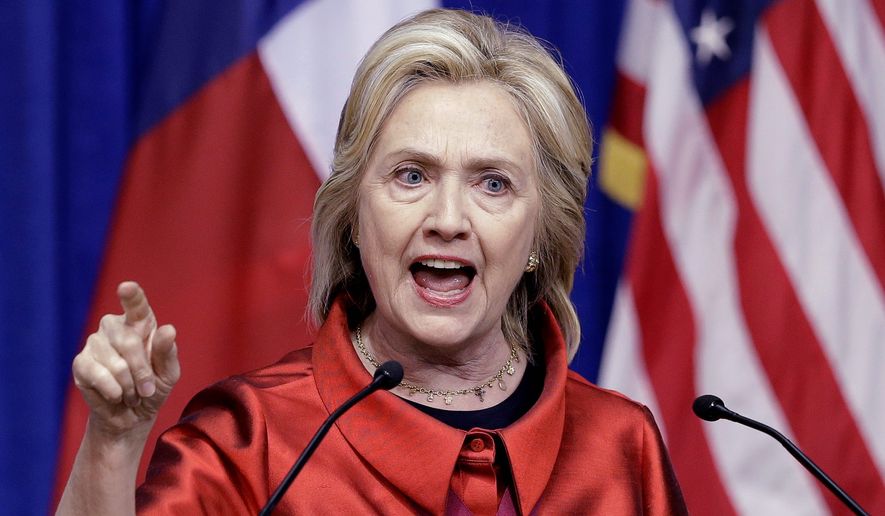Democratic presidential front-runner Hillary Rodham Clinton has pivoted left on domestic issues but stands out on foreign policy as more hawkish than some of her GOP rivals, even stoking fears that she’s ready to put the U.S. on a warpath with Russia.
Mrs. Clinton is poised to make her foreign policy experience as senator and secretary of state a central argument for her White House run. It’s a record that includes supporting military intervention in Iraq and Libya, positions that put her at odds with her party’s liberal base.
And since leaving the State Department in 2013, her harsh rhetoric about Russia raised eyebrows among hawks and doves alike.
At a California fundraiser last year, she reportedly compared Russian President Vladimir Putin to Adolf Hitler. At a meeting earlier this year with London Mayor Boris Johnson, he said she faulted European leaders for being “too wimpy” about challenging Mr. Putin.
Conservative commentator Paul Craig Roberts, an economist who served as assistant secretary of treasury under President Reagan, warned that Mrs. Clinton will have a difficulty backing down from a confrontation with Mr. Putin after calling him Hitler.
“When you go that far out on a limb, you really kind of have to go the rest of the way,” he said in an interview at Infowars.com. “I don’t’ think there is any candidate that we can end up with as president that would be more likely to go to war with Russia than Hillary.”
Mrs. Clinton isn’t the only candidate to take a tough stand on Russia’s annexation of Crimea and ongoing involvement in the warfare in eastern Ukraine. But she brings more heat to the discourse than any other Democrat or most Republicans.
Former Florida Gov. Jeb Bush, who is expected to announce his presidential run next week, gave a speech Wednesday in Berlin in which he said the West should “push back” against Russian aggression.
Mr. Bush described Mr. Putin as a bully who “will push until someone pushes back.”
But he warned against being reactionary and pushing away the Russian people, as occurred during the Cold War.
“I don’t think we should be reacting to bad behavior. By being clear of what the consequences of that bad behavior is in advance, I think we will deter the kind of aggression we fear from Russia,” he said. “But always reacting and giving the sense we’re reacting in a tepid fashion only enables the bad behavior of Putin.”
Still, Mr. Roberts said that Mrs. Clinton doesn’t just talk tough but “is in tight with the military-security complex.”
Former Green Party presidential candidate Ralph Nader recently called her “a deep corporatist and a deep militarist.”
He said that when Mrs. Clinton served on the Senate Armed Services Committee, she “never met a weapons system she didn’t like.”
Mr. Nader also blamed Mrs. Clinton for “almost single-handedly” pushing President Obama into lending U.S. military support to depose Libyan dictator Moammar Gadhafi, which unleashed chaos in the country that spread throughout the region and helped the terrorist army that calls itself the Islamic State gain a foothold.
“She persuaded the White House that it was an easy topple without knowing that, in a tribal society with nothing to replace it, you would have a civil war, sectarian killings spilling into Africa [and] weapons everywhere [in] Mali [and] central Africa. The big thing is the huge amount of geography that has been destabilized because of the Libyan overthrow.”
Mr. Nader’s criticism echoed comments form some of Mrs. Clinton’s Republican rivals, including Sen. Rand Paul of Kentucky, who has said that she will have to answer not only for the deadly attack on the U.S. compound in Benghazi but for the other far-reaching consequences of her Libya policy.
For liberal activists, Mrs. Clinton’s foreign policy record compounds their concerns that she doesn’t truly support their agenda.
“We definitely view Hillary as pretty far right when it comes to foreign policy,” said Alli McCracken, national coordinator for the feminist anti-war group Code Pink.
She said that Mrs. Clinton acts “more like a war general than a diplomat,” including supporting the Iraq invasion, the troop surge in Afghanistan, the Libya overthrow and a potential strike on Iran.
“I hope that the left puts pressure on her to break away from the status quo,” said Ms. McCracken. “I hope that there is pressure put on her to not just have left-leaning domestic polices and support of women’s rights here in the U.S. but women’s rights everywhere, and that means taking military options off the table.”
• S.A. Miller can be reached at smiller@washingtontimes.com.




Please read our comment policy before commenting.